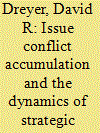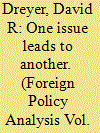|
|
|
Sort Order |
|
|
|
Items / Page
|
|
|
|
|
|
|
| Srl | Item |
| 1 |
ID:
099115


|
|
|
|
|
| Publication |
2010.
|
| Summary/Abstract |
Although states at times contend over a single issue (such as territory), international rivals often contend over multiple issues simultaneously. Issue conflicts tend to accumulate among rivals due to the development of enemy images of the "other," which causes states to view as threatening, behavior that was previously viewed as non-threatening. Once multiple issues are on the agenda, issues become linked as states begin to view the "other" as the main problem in settling all disagreements. Issue accumulation also increases the stakes of rivalry, which likely increases the probability that states will choose to bear the costs of engaging in militarized conflict seeking the settlement of issues in one's favor. An examination of strategic rivals supports the expectations that issue conflict accumulation tends to increase the likelihood of militarized disputes and war. The results also reveal that some paths of issue accumulation, in which certain types of issues come under contention, tend to be more dangerous than others.
|
|
|
|
|
|
|
|
|
|
|
|
|
|
|
|
| 2 |
ID:
105445


|
|
|
|
|
| Publication |
2011.
|
| Summary/Abstract |
Reality television programming has become a pervasive part of popular culture. Although such programming may seem to be mindless entertainment, it can serve as a tool to introduce political lessons in the classroom. This article examines how the concepts of alliance behavior and strategic voting can be explored by using the television program Survivor. An analysis reveals that contestants often behave strategically when forming alliances and voting, in ways that are similar to the strategic behavior of nation-states and individuals residing in democracies, respectively. This article does not suggest that reading political science texts should be replaced with viewing reality television, but rather that instructors can introduce abstract concepts to undergraduate students through popular culture. Such a technique can spark students' interest in politics and demonstrate the broad relevance of political concepts, leaving students with the desire to delve more deeply into the investigation of political phenomena.
|
|
|
|
|
|
|
|
|
|
|
|
|
|
|
|
| 3 |
ID:
100264


|
|
|
|
|
| Publication |
2010.
|
| Summary/Abstract |
Rather than competition over one issue or another (such as territory or status) leading to war, in this study it is argued that war is often likely the result of an issue spiral-a dynamic process in which tension increases as multiple issues accumulate. Once an initial issue disagreement is established, the development of enemy images may cause states to view the "other's" behavior and intentions in relation to additional issues as threatening. States may subsequently seek to gain an advantage on a new issue in order to prevent one's competitor from doing so, or in order to gain leverage on other issues. A state's aggressive actions in relation to new issues tend to reinforce their rival's perceptions that the state has aggressive intentions in relation to earlier established disagreements, further increasing tension. Issue accumulation, furthermore, increases the stakes of competition, which increases the likelihood that states will be willing to bear the costs of war seeking favorable issue settlement. As tension heightens and the rationality of engaging in large-scale militarized conflict increases, a state may initiate war if a rival presses its demands on an issue fearing that failure to demonstrate resolve will lead one's competitor to press its demands on other issues as well. An examination of relations between China and Vietnam in the 1970s reveals that an issue spiral, in which one issue led to another and the accumulation of issues contributed to the deterioration of relations, precipitated the 1979 Sino-Vietnamese War.
|
|
|
|
|
|
|
|
|
|
|
|
|
|
|
|
| 4 |
ID:
138768


|
|
|
|
|
| Summary/Abstract |
This study reconstructs the concept of interstate rivalry in accordance with a min–max strategy in order to determine the necessary characteristics of rivalry, provide a template with which to assess existing conceptualizations, and provide a means by which conceptualizations of rivalry can be formulated and operationalized. I argue that there are two necessary characteristics of a minimal conceptualization of interstate rivalry — temporal dependence and issue competition. Contextual conceptualizations are then formulated by adding dimensions, such as militarization, identification, and psychological hostility, among others, to the minimal definition. By defining interstate rivalry in its most extreme form (when all of the potential dimensions of rivalry are present in the fullest), I also establish a maximal or ‘ideal-type’ conceptualization. In adopting a min–max approach, this project seeks to unify conceptualizations of interstate rivalry along a common continuum in which the empirical coverage of cases decreases as properties are added to the minimal definition.
|
|
|
|
|
|
|
|
|
|
|
|
|
|
|
|
|
|
|
|
|